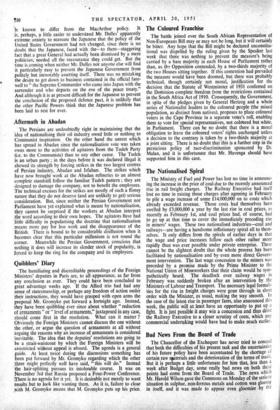Aftermath in Abadan
The Persians are undoubtedly right in maintaining that the idea of nationalising their oil industry owed little or nothing to Communist inspiration. On the other hand the unrest which has spread in Abadan since the nationalisation vote was taken owes more to the activities of agitators from the Tudeh Party (i.e. to the Communists) than to any other cause. The Tudeh is an urban party ; in the days before it was declared illegal it showed its strength by forcing strikes in the two largest centres of Persian industry, Abadan and Isfahan. The strikes which have now brought work at the Abadan refineries to an almost complete standstill follow the familiar Tudeh pattern ; they are designed to damage the company, not to benefit the employees. The technical excuses for the strikes are mostly of such a flimsy nature that they do not deserve (and are unlikely to get) serious consideration. But, since neither the Persian Government nor Parliament have yet explained what is meant by nationalisation, dry cannot be surprised if the workers at Abadan interpret the word according to their own hopes. The agitators have had little difficulty in popularising the doctrine that nationalisation means more pay for less work and the disappearance of the British. There is bound to be considerable disillusion when it becomes clear that this particular millenium is not round the corner. Meanwhile the Persian Government, conscious that nothing it does will increase its slender stock of popularity, is forced to keep the ring for the company and its employees.


































 Previous page
Previous page